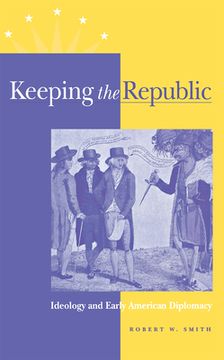Synopsis "keeping the republic: ideology and early american diplomacy"
How did the ideology that inspired the American Revolution and the U.S. Constitution translate into foreign policy? John Adams, Thomas Jefferson, James Madison, and Alexander Hamilton each struggled with this question as they encountered foreign powers. The French Revolution, the purchase of the Louisiana Territory, and the illegal seizures of U.S. ships and sailors on the high seas all brought diplomatic challenges. In the process of developing foreign policy, the founding generation refined the meaning of republicanism.In Keeping the Republic, Robert W. Smith identifies three contending brands of republicanism--classical, whig, and yeoman--that shaped the founders' thinking. Jefferson and Madison pursued a yeoman republicanism with its faith in economic sanctions rather than military might as a means of diplomacy. Nations dependent upon American agricultural exports, they thought, would bow to American interests. Both Adams and Hamilton, originally admirers of classical republicanism and its belief in public virtue, came to adopt a whig republicanism that applied the balance-of-power principle, exemplified by the three branches of the federal government, to the international community. In this view, nations should have equal naval power.Ideology had real consequences: Jefferson's insistence on imposing a trade embargo rather than considering alternative solutions resulted in the War of 1812. This process of translating ideology into foreign policy, so ably described in Keeping the Republic, continues to shape American international relations in the twenty-first century.

